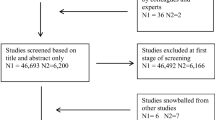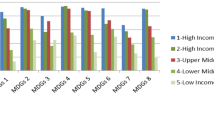Abstract
The search for alternative indicators of development has witnessedthe development of a variety of composite indices of development. Theseindices integrate various social, political and economic aspects ofdevelopment in measurement. This paper presents an overview andevaluation of composite indices of development in terms of certain broaddimensions of measurement. In terms of method and technique, compositeindices are generally additive ones with equally weighted componentsconsisting of variables selected in an ad hoc manner. Numerouscriticisms have been leveled at these methods employed in compositeindexing. Composite indices are mainly quantitative insofar as theindices are all presented in numerical format. Composite indices aresubject to subjectivity despite the relative objectivity of the methodsemployed in composite indexing. Composite indices are of a cardinalnature, but remain ordinal insofar as differences in index values cannotbe interpreted meaningfully. The multidimensionality of compositeindices represents one of their main advantages. Indices representaggregate measures of a combination of complex development phenomena.The comparative application of composite indices of development overspace and time remains problematic. Composite indices generally combinemeasures of ends and means. In respect of method and technique,composite indexing is relatively complex. Composite indices arerelatively flexible, because changes in selection, scaling, weightingand aggregation can be effected readily, albeit at the cost ofcomparability. Composite indices perform relatively well in terms ofcross-national availability, but few indices perform well in terms ofinter-temporal availability. On the strength of the systematic positiveassociation between income and popular composite indices such as theHDI, many have claimed that these indices represent no real contributionto the literature on indicators research. Composite indices,furthermore, are often considered to be ideological statements ratherthan practically functional indicators. Yet, composite indices representuseful supplements to income-based development indicators. These indicesremain invaluable in terms of their ability to simplify complexmeasurement constructs, to focus attention and to catch the eye, thusenhancing their political appeal.
Similar content being viewed by others
REFERENCES
Adelman, I. and C.T. Morris: 1972, 'The measurement of institutional characteristics of nations: Methodological considerations', Journal of Development Studies 8, pp. 111-135.
Anand, S. and M. Ravallion: 1993, 'Human development in poor countries: On the role of private incomes and public services', Journal of Economic Perspectives 7, pp. 133-150.
Babbie, E.: 1995, The Practice of Social Research (Wadsworth, Washington, pp. 161-175).
Baster, N.: 1985, 'Social indicator research: Some issues and debates', in J.G.M. Hilhorst and M. Klatter (eds.), Social Development in the Third World: Level of Living Indicators and Social Planning (Croom Helm, London, pp. 36-43).
Beckerman, W. and R. Bacon: 1966, 'International comparisons of income levels: A suggested new measure', Economic Journal 76, pp. 519-536.
Bennett, M.K.: 1951, 'International disparities in consumption levels', American Economic Review 41, pp. 632-649.
Child, D.: 1970, Essentials of Factor Analysis (Holt, Reinhart and Winston, London, pp. 1-10).
Diener, E.: 1995, 'A value based index for measuring national quality of life', Social Indicators Research 36, pp. 107-127.
Diener, E. and E. Suh: 1997, 'Measuring quality of life: Economic, social, and subjective indicators', Social Indicators Research 40, pp. 189-216.
Drewnowski, J.: 1972, 'Social indicators and welfare measurement: remarks on methodology', Journal of Development Studies 8, pp. 77-90.
Drewnowski, J.: 1974, On Measuring and Planning the Quality of Life (Mouton, Paris, pp. 19-33).
Dunn-Rankin, P.: 1983, Scaling Methods (Lawrence Erlbaum, London, pp. 1-27).
Elkan, W.: 1995, An Introduction to Development Economics (Harvester Wheat-sheaf, London, p. 12).
Elster, J. and J.E. Roemer (eds.): 1991, Interpersonal Comparisons of Well-Being (Oxford University Press, New York, pp. 5-15).
Estes, R.J.: 1984, The Social Progress of Nations (Praeger, New York, pp. 1-179).
Everitt, B.S. and G. Dun: 1991, Applied Multivariate Data Analysis (Edward Arnold, London, pp. 97-126).
Felipe, J. and M. Resende: 1996, 'A multivariate approach to the measurement of development: Asia and Latin America', Journal of Developing Areas 30, pp. 183-210.
Ginsberg, N., J. Osborn and G. Blank: 1986, Geographic Perspectives on the Wealth of Nations, Department of Geography Research Paper No. 220 (University of Chicago, Chicago, pp. 17-120).
Greeley, M.: 1994, 1 Measurement of poverty and poverty of measurement', Institute of Development Studies Bulletin 25, pp. 50-58.
Gwartney, J., R. Lawson and W. Block: 1996, Economic Freedom of the World (1975–1995) (Free Market Foundation, Johannesburg, pp. 1-46).
Harbison, F. and C.A. Myers: 1964, Education, Manpower, and Economic Growth (McGraw-Hill, New York, pp. 23-24).
Hess, P.: 1989, 'The military burden, economic growth, and the human suffering index: evidence from the LDCs', Cambridge Journal of Economics 13, pp. 497-515.
Hopkins, M.: 1991, 'Human development revisited: A new UNDP report', World Development 19, pp. 1469-1473.
Johnston, B.T. and T.P. Sheehy: 1995, The Index of Economic Freedom (Heritage Foundation, Washington, pp. ix-21).
Kallmann, K. (ed.): 1997, An Introduction to Social Indicators and Social Reporting: A Digest of the Literature, Centre for Social and Development Studies Research Report No. 9, (University of Natal, Durban, pp. 13-18).
Lind, N.C.: 1992, 'Some thoughts on the Human Development Index', Social Indicators Research 27, pp. 89-101.
McGillivray, M.: 1991, 'The Human Development Index: Yet another redundant Composite Development Indicator?', World Development 19, pp. 1461-1468.
McGranahan, D.V., Richard-Proust, C., Sovani, N.V. and Subramanian, M.: 1972, Contents and Measurement of Socioeconomic Development, A Staff Study of the United Nations Research Institute for Social Development (UNRISD) (Praeger, New York, pp. 3-136).
McGranahan, D.: 1995, 'Measurement of development: Research at the UN's Research Institute for social development', International Social Science Journal 143, pp. 39-57.
Morgan, J.N.: 1968, 'The supply of effort, the measurement of well-being, and the dynamics of improvement', American Economic Review 58, pp. 31-39.
Morris, M.D.: 1979, Measuring the Condition of the World's Poor: The Physical Quality of Life Index, Pergamon Policy Studies No. 42, (Pergamon Press, New York, pp. 20-56).
Ogwang, T.: 1994, 'The choice of principal variables for computing the Human Development Index', World Development 22, pp. 2011-2014.
Perthel, D.: 1981, Laws of Development, Indicators of Development, and their Effects on Economic Growth, Doctoral Thesis (University of Amsterdam, Amsterdam, pp. 6-7).
Pomfret, R.: 1997, Development Economics (Prentice Hall, London, p. 278).
Ram, R.: 1982, 'Composite indices of physical quality of life, basic needs fulfilment, and income: a principal component representation', Journal of Development Economics 11, pp. 227-247.
Rao, V.V.B.: 1991, 'Human Development Report 1990: Review and assessment', World Development 19, pp. 1451-1460.
Rao, M.V.S., K. Porwit and N. Baster: 1978, Indicators of Human and Social Development: Report on State of the Art (United Nations University, New York, pp. 31-117).
Rose, R.: 1995, 'Making progress and catching up: Comparative analysis for social policy-making', International Social Science Journal 143, pp. 113-125.
Sainz, P.: 1989, 'An index of social welfare', in F. Bracho (ed.), Towards a New Way to Measure Development, Report on the International Meeting on More Effective Development Indicators, July 31 to August 3 (Caracas, Venezuela, pp. 156-160).
Slottje, D.J.: 1991, 'Measuring the quality of life across countries', Review of Economics and Statistics 73, pp. 684-693.
Srinivasan, T.N.: 1994a, 'Data base for development analysis: An overview', Journal of Development Economics 44, pp. 3-27.
Srinivasan, T.N.: 1994b, 'Human development: A new paradigm or reinvention of the wheel?', American Economic Review (Papers and Proceedings) 84, pp. 238-243.
Stewart, F.: 1985, Planning to Meet Basic Needs (Macmillan, London, pp. 1-66).
Stoikov, V.: 1967, 'International comparisons of income levels', Economic Journal 77, pp. 939-944.
Streeten, P.: 1994, 'Human development: Means and ends', American Economic Review (Papers and Proceedings) 84, pp. 232-237.
Streeten, P.: 1995a, 'Forward', in M. Ul Haq (ed.), Reflections on Human Development (Oxford University Press, New York, pp. viii-xiv).
Streeten, P.: 1995b, 'Human development: The debate about the index', International Social Science Journal 143, pp. 25-37.
Thais, L.: 1989, 'Reflections on an Alternative Development Indicator', in F. Bracho (ed.), Towards a New Way to Measure Development, Report on the International Meeting on More Effective Development Indicators, July 31 to August 3 (Caracas, Venezuela, p. 174).
Thiessen, H.: 1997, Measuring the Real World: A Textbook of Applied Statistical Methods (John Wiley & Sons, Chichester, pp. 13, 142).
Todaro, M.P.: 1989, Economic Development in the Third World (Longman, New York, pp. 108-113.
Townsend, P. (ed.): 1971, The Concept of Poverty: Working Papers on Methods of Investigation and Life-Styles of the Poor in Different Countries (Heinemann, London, pp. 2-24).
Ul Haq, M.: 1995, Reflections on Human Development (Oxford University Press, New York, pp. 46-57).
United Nations Development Programme: 1996, Human Development Reports 1996 (Oxford University Press, New York, pp. 106-108).
United Nations Development Programme: 1999, Human Development Reports 1999 (Oxford University Press, New York, pp. 159-163).
United Nations Development Programme: 1997, Glossary of Poverty and Human Development, Available: http://www.undp.org/undp/news/HDR97/pr7-eng.html (14 October 1998).
Veenhoven, R.: 1996, 'Happy life-expectancy: A comprehensive measure of quality-of-life in nations', Social Indicators Research 39, pp. 1-58.
Weigel, Van B.: 1986, 'The basic needs approach: Overcoming the poverty of Homo Oeconomicus', World Development 14, pp. 1423-1434.
Wilson, R.K. and C.S. Woods: 1982, Patterns of World Economic Development (Longman Sorrett, Melbourne, p. 11).
Wish, N.B.: 1986, 'Are we really measuring the quality of life?', American Journal of Economics and Sociology 45, pp. 93-99.
World Economic Forum: 1996, Global Competitiveness Report 1996 (WEF, Geneva, pp. 5-39).
Author information
Authors and Affiliations
Rights and permissions
About this article
Cite this article
Booysen, F. An Overview and Evaluation of Composite Indices of Development. Social Indicators Research 59, 115–151 (2002). https://doi.org/10.1023/A:1016275505152
Issue Date:
DOI: https://doi.org/10.1023/A:1016275505152




